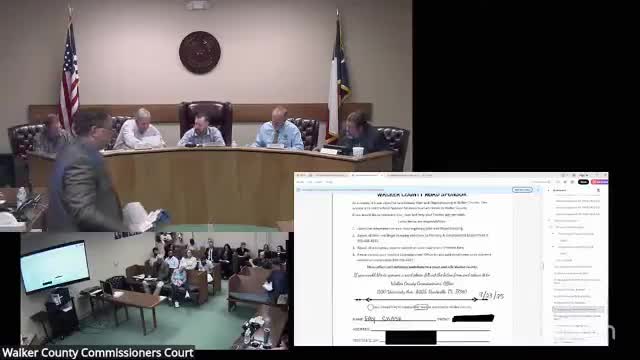Commissioners grant variance allowing steeper slopes in limited areas of Legacy Grand Ranch plan
Get AI-powered insights, summaries, and transcripts
Subscribe
Summary
The court approved a variance permitting up to 3:1 slopes at specific creek crossings in the Legacy Grand Ranch subdivision, with engineering and stabilization requirements attached to final plan approval.
Walker County commissioners on Monday approved a limited variance allowing developers of Legacy Grand Ranch to use steeper slopes at identified creek-crossing areas as they finalize subdivision design.
The court—s action modifies a standard in county subdivision regulations that ordinarily limits roadside and ditch slopes to gentler grades. Commissioners and county staff said the variance applies only to stationed, identified locations and requires engineered slope-stabilization measures and specific erosion-control materials.
Developer representatives said they had identified the precise stations where existing site conditions make standard slopes impractical and asked the court for authority to design up to a 3-to-1 slope in those locations. Jacob Slott, a contractor representing the developer, told the court the intent is to design stabilization (riprap, sod, erosion-control mats, hydromulch or equivalent products such as Flexterra) and then submit detailed plans for county review.
County planning staff recommended caution, noting that a typical hydromulch is less stable on steep slopes and that residents or maintenance crews would face more difficult mowing and repairs. "Flexterra or equivalent" was suggested as a more durable option than ordinary hydroseed, and staff asked that the developer include engineered slope stabilization in final plans.
The court—s motion approved the variance with these stipulations: the maximum slope may not exceed 3-to-1 where identified; the developer must include engineered slope-stabilization measures in final designs; and stabilization must use one of the approved techniques (sod, riprap, erosion-control mats, Flexterra or equivalent, or slope paving). Final construction plans will be reviewed by county engineering staff and inspected during construction and maintenance.
County officials said the variance is limited and that they will require field inspections and corrective measures during the maintenance period if erosion or slope stability issues emerge. The motion passed by voice/hand vote; commissioners did not read a roll-call tally during the item.
